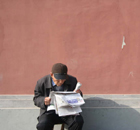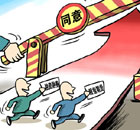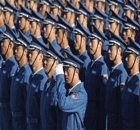Opinion
China cements position as economic power
By Charles A Tang (China Daily)
Updated: 2009-12-05 07:14
 |
Large Medium Small |
The intensity and velocity with which the world became submerged in a steep economic crisis took all the nations of our globe by surprise. China initially suffered intensely, seeing the closure of tens of thousands of its, mostly labor intensive, industries.
However, the prompt reaction by the Chinese government and those of other countries in providing huge stimulus packages has seemingly abbreviated and averted the worst of what was being forecast.
The post-crisis China is a different China and its position in the world order of economic strength and of respect has changed.
Although not yet independent from exports, China has reduced its dependence on external markets. China has even increased its share of the world market, albeit a market reduced by the crisis.
With its gigantic volume of reserves, it is consolidating its economic advances by assuring long-term supply of strategic products from petroleum to minerals and foodstuff.
This crisis has made international assets cheaper for China to acquire strategic industries and businesses. Many critics have pointed out that China does not have the management, R&D, laboratories and technology to become a major world economic and business player. However, all of these factors are in abundant supply due to the crisis and can all be presently bought at a discount.
As China does not share the missionary zeal of the United States to mold the world to its own image by imposing its beliefs on other countries, or to resort to arms to achieve this, it has had an easier experience in striking economic alliances with most nations of the world. China's main interest is simply to do business and to secure the sources of the strategic resources it needs to sustain its growth and to feed its people.
Most strikingly, while the "wealthy" world is trying to fix its industries of today, China is investing huge sums into developing the industries of the next century that will create millions of new jobs to compensate for the almost 40 million jobs lost by the crisis. China's decision to go green will also develop a gigantic internal market for these industries to provide economies of scale and research technology.
From nanotechnology to electric cars, solar energy, wind turbines, solar street lighting and others, China will become a dominant force in the new hi-tech industries of the future. The amount of engineers China produces and a leadership made up of engineers will also contribute to this.
The vast resources being invested to build China's modern infrastructure and to promote the growth throughout western and central China is impressive. These investments will also help assure its sustained growth for the next decades.
Presently, the so-called "rich nations" control the international financial system although they have become debtor countries. China and other emerging creditor nations insist that they should have a greater voice in the World Bank and the IMF.
To protect their reserves, many of these nations want to substitute the ever-declining dollar with another world currency. China has made efforts to internationalize its currency in realizing currency swaps with many nations. It has also allowed trade to be settled in the yuan from several of its main trading cities, in Hong Kong and with the ASEAN countries. The sale of yuan-denominated bonds will also aid China to internationalize its currency.
The global balance of power has been altered in the post-crisis world. From the emerging nation of yesterday China has consolidated its position as a major world economic power.
The author is founding member of IPEDE - Institute for Research and Study of Economic Development and bi-national chairman of the Brazil China Chamber of Industry & Commerce.













